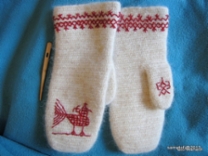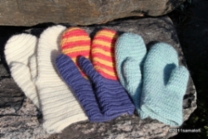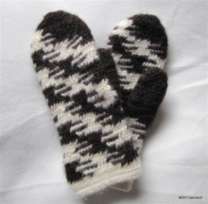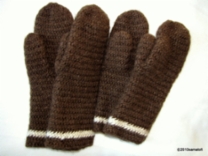Nalbinding - Nålbindning - Nålebinding

Nalbound mittens in Russian Stitch, decorated with Carelian style embroidery (reversible double running stitch or Holbein Stitch)
Welcome to my nalbinding site!
Instructions can be found in the menu Step by Step. There are instructions
for how to start nalbinding, how to join the pieces of yarn together,
how to increase and decrease, how to finish off the work, and how to
make a thumb. There are also outline patterns for nalbound mittens and socks in different sizes.
Under Videos menu there is a list of the nalbinding videos I have made. The videos have been listed under separated headlines, for example how to start nalbinding, and how to continue to the second row.
In the submenus of the main menu you can find a few words about the
history of nalbinding, Hansen's Notation, stitch classification by
Kaukonen, nalbinding needles, and a list of nalbinding books and magazine articles.

Nalbound mittens in Finnish Stitch, and Turning Stitch
Nalbinding is an ancient handicraft technique which has been known in many places around the world at least in some period in the history. Other words used to describe nalbinding are for example naalbinding, nalebinding, naalebinding, nålbinding, nålebinding, needle binding, nailbinding, looped needle-netting, needle coiling, knotless netting, and single needle knitting.

Nalbound mittens in Russian Stitch

Nalbound mittens in Oslo Stitch Finnish Stitch 1+1
There are numerous nalbinding stitches. There are also various ways of holding the work and manipulating the loops. Some people prefer to work flat, without thumb loops, while others prefer to keep one or more loops around their thumb. Your way of nalbinding is by no means wrong although it might look different from someone else's, and you might even invent a stitch of your own.
Happy Nalbinding!
Sanna-Mari Pihlajapiha
In Finland, however, these terms "Finnish" and "Russian" refer to the way of making stitches, and they cover not just one but many stitches. That is why I would rather talk about the "Finnish Stitch Family" (two-phased stitches) and the "Russian Stitch Family" (three-phased stitches).



